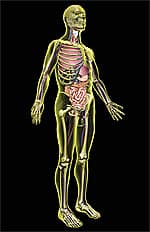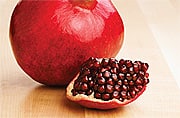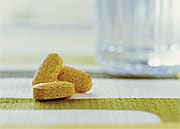Life Extension Magazine®
United States Patent Granted for Irvingia | |
On May 26, 2009, the US Patent and Trademark Office formally granted a patent on the Irvingia gabonensis extract that Life Extension introduced in November 2008. This plant extract has shown significant weight loss and lipid control in human clinical trials.1,2 Some claims granted in this newly issued patent include: preventing Syndrome X (a common metabolic disorder that includes abdominal obesity); reducing triglycerides, total cholesterol, and LDL; increasing HDL; and lowering blood pressure, body mass index, and the percentage of stored body fat. Irvingia was also awarded patent protection based on its ability to control the absorption of carbohydrates in the digestive tract by inhibiting the activity of the alpha-amylase enzyme, thereby regulating fasting and postprandial blood glucose levels. In addition, Irvingia is patented to inhibit the activity of glycerol-3-phosphate dehydrogenase, an enzyme involved in the excess conversion of blood glucose to triglyceride fat storage in the body. Life Extension recommends that most overweight individuals follow the comprehensive fat-reducing protocols described in the June 2009 issue of Life Extension magazine. These protocols are now available at www.lifeextension.com
| |
| Reference | |
| 1. Lipids Health Dis. 2009 Mar 2;8:7. | |
Broccoli Chemicals May Reduce Prostate Cancer Incidence | |
| British researchers recently reported that broccoli consumption results in significant genetic changes associated with protection against prostate cancer.1 These findings build on numerous observational studies showing that greater consumption of broccoli and other cruciferous vegetables is associated with a reduced risk of prostate cancer.2,3 Investigators recruited 22 men, 55-70 years old, with a pre-existing diagnosis of high-grade prostatic intraepithelial neoplasia (PIN), the pre-invasive stage of prostate cancer. Subjects were randomly assigned to consume either a broccoli-rich diet or a control diet for 12 months. Gene expression profiles from prostate tissue samples were analyzed before, during, and after the study period. Men on the broccoli diet experienced “complex changes to signaling pathways associated with inflammation and carcinogenesis in the prostate.”1 These changes evidently occur when cruciferous vegetable chemicals known as isothiocyanates interact with signaling protein fragments circulating in the bloodstream. In essence, broccoli isothiocyanates promote hundreds of genetic changes, by switching off genes that promote cancer growth, and by switching on genes that fight cancer. —Dale Kiefer | |
| Reference | |
| 1. PLoS ONE. 2008 Jul 2;3(7):e2568. | |
White Tea Fights Fat | |
In an article published online in the journal Nutrition & Metabolism, researchers in Germany reveal that an extract of white tea helps prevent the formation of mature adipose (fat) cells in culture, as well as reduces the fat content of these cells, which could help reduce body fat.* Marc Winnefeld and his associates administered varying concentrations of a solution containing 3% white tea to cultures of human preadipocytes, which differentiate into fat cells in a process known as adipogenesis. Treatment with white tea was shown to reduce adipogenesis without affecting cell viability. In an additional experiment using mature adipocytes, mobilization of fat occurred in cells treated with white tea. The researchers believe that the polyphenol epigallocatechin-3-gallate (EGCG), along with the methyl-xanthines caffeine and theobromine that are present in white tea, are responsible for the effects observed in the current study. —Dayna Dye | |
| Reference | |
| * Nutr Metab (Lond). 2009 May 1;6(1):20. | |
More Dietary Potassium as Important as Less Sodium For Cardiovascular Health | |
| New research suggests that increasing one’s intake of potassium may be just as important as decreasing one’s intake of sodium for optimal cardiovascular health.* For many years doctors have stressed that in order to maintain healthy blood pressure, people should reduce their intake of table salt, the greatest source of dietary sodium. Investigators affiliated with Harvard Medical School gathered data from more than 2,000 men and women with pre-hypertension, whose progress was monitored for 10 to 15 years. Sodium to potassium excretion rates from 24-hour urine collections were compared with the incidence of cardiovascular disease events, such as stroke, heart attack, or death from cardiovascular disease. “A higher sodium to potassium excretion ratio is associated with increased risk of subsequent cardiovascular disease, with an effect stronger than that of sodium or potassium alone,” researchers concluded. In essence, this means that it may be just as important to increase potassium intake as it is to reduce sodium intake, in order to protect cardiovascular health. —Dale Kiefer | |
| Reference | |
| * Arch Intern Med. 2009 Jan 12;169(1):32-40. | |
Probiotic Ingredient Improves Digestive Health | |
A new controlled study shows that a patented strain of probiotic, Ganeden BC30™ Bacillus coagulans significantly reduces symptoms of abdominal pain and bloating among patients with irritable bowel syndrome.1 Irritable bowel syndrome is a chronic gastrointestinal disorder characterized by abdominal pain or discomfort and alterations in bowel habits, particularly diarrhea. The disorder affects up to 25% of the population, and disproportionately affects women.2 This eight-week, randomized, double-blind, placebo-controlled clinical trial examined the effects of Bacillus coagulans supplementation on irritable bowel syndrome symptoms among 44 patients with the disorder. Results showed that Bacillus coagulans significantly relieved symptoms of abdominal pain and bloating, compared with placebo. No adverse events were reported.1 Since few, if any, effective FDA-approved treatments exist to manage irritable bowel syndrome, Bacillus coagulans may offer welcome relief for the many individuals affected by the condition. —Dale Kiefer | |
| Reference | |
| 1. Postgrad Med. 2009 Mar;121(2):119-24. | |
Vitamin D and Calcium May Protect Against Diabetes | |
| Consumption of calcium and vitamin D may reduce the risk of developing type 2 diabetes, according to researchers at the Harvard School of Public Health.* Scientists compared data obtained from men and women participating in two long-term studies of health and nutrition. Using plasma C-reactive protein as a marker for the oxidative stress associated with type 2 diabetes, investigators compared subjects’ plasma vitamin D status with total intakes of calcium and vitamin D. Calcium intake was moderately associated with lower C-reactive protein levels among women, but not men. Men with the highest levels of plasma vitamin D had 20% lower concentrations of C-reactive protein than men with the lowest levels of the vitamin; there was no such association found for women. “The results suggest that calcium intake or systemic vitamin D status, after adjustment for intake of dairy products, is associated with decreased insulin secretion,” researchers concluded. —Dale Kiefer | |
| Reference | |
| * J Nutr. 2009 Mar;139(3):547-54. | |
Folic Acid May Protect the Brain Against Alzheimer’s Disease | |
Dietary folic acid could help protect brain cells against Alzheimer’s disease by preventing damage to proteins that repair damaged DNA, according to a recent report.* According to scientists at the National Institute on Aging Intramural Research Program, unrepaired DNA damage among cells in the brain can cause neurons to undergo apoptosis, or “programmed” cellular suicide. Certain proteins act to facilitate DNA repair, but deficits in these proteins render neurons vulnerable to apoptosis, which may underlie neurodegenerative disorders such as Alzheimer’s disease or stroke. It is believed that telomeres—genetic sequences at the end of chromosomes—produce proteins involved in DNA maintenance and repair under normal circumstances. But certain substances, such as the amino acid homocysteine, are toxic to telomeres, impairing their ability to mend damaged DNA. Fortunately, dietary folic acid suppresses the accumulation of homocysteine. “Work in this and other laboratories has shown that dietary folic acid can protect neurons against Alzheimer’s disease by keeping homocysteine levels low…” wrote researchers. —Dale Kiefer | |
| Reference | |
| * Neuroscience. 2007 Apr 14;145(4):1439-48. | |
Inflammation Reduced in Those With Higher Vitamin D Levels | |
Research conducted at the University of Missouri’s Department of Nutritional Sciences by Catherine A. Peterson, PhD, RD, has correlated low vitamin D levels with an increased marker of inflammation.* The study included 69 women classified as being high or low in vitamin D based on ultraviolet-B exposure. Mean serum vitamin D levels were significantly greater in those with increased sun exposure compared with those in the low D group. Dr. Peterson found that the inflammatory marker TNF-alpha averaged 0.79 pg/mL in the high vitamin D group and 1.22 pg/mL among those categorized as low in the vitamin. Higher serum vitamin D levels were also correlated with lower TNF-alpha levels. The study is the first to determine an association between low levels of TNF-alpha and higher vitamin D levels in a healthy population. The discovery could help explain the protective association found for vitamin D against inflammatory diseases. —Dayna Dye | |
| Reference | |
| * J Inflamm (London). 2008 July 24;5:10. | |











